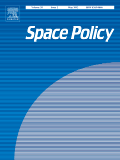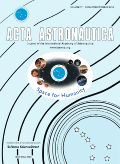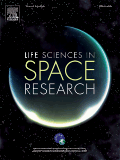
NPJ Microgravity
metrics 2024
Advancing Knowledge in Weightless Environments
Introduction
NPJ Microgravity, published by NATURE PORTFOLIO, is a premier open-access journal dedicated to advancing research in microgravity environments, complementing extensive studies in fields as diverse as Agricultural and Biological Sciences, Biochemistry, Materials Science, Medicine, Physics, and Space and Planetary Science. Since its inception in 2015, the journal has rapidly established itself as an influential platform for disseminating cutting-edge research, evidenced by its Q1 quartile rankings across multiple disciplines and impressive Scopus rankings, including a top 10 placement in Physics and Astronomy. Based in the United Kingdom with an address of HEIDELBERGER PLATZ 3, BERLIN 14197, GERMANY, NPJ Microgravity not only champions innovative studies but also promotes collaborations that can translate scientific knowledge into tangible benefits for society. As an open-access journal, it offers unparalleled accessibility to high-quality research, making it an essential resource for researchers, professionals, and students with a keen interest in the applications and implications of microgravity research.
Metrics 2024
 -
- 4.40
4.40 4.90
4.90 -
-Metrics History
Rank 2024
IF (Web Of Science)
JCI (Web Of Science)
Quartile History
Similar Journals

Chinese Space Science and Technology
Connecting Global Minds in Aerospace DevelopmentChinese Space Science and Technology is a pivotal journal dedicated to advancing the field of space engineering and technology, published by the esteemed Chinese Academy of Space Technology. With an ISSN of 1000-758X, this publication serves as a significant platform for cutting-edge research from China and around the globe, spanning vital intersections of Aerospace Engineering, Electrical and Electronic Engineering, and Materials Science. As evidenced by its Q3 ranking in 2023 across these categories, the journal consistently showcases innovative studies that contribute to the development of space technology, thereby impacting both theoretical frameworks and practical applications in the industry. Researchers and professionals will find valuable insights within its pages, while students can enrich their educational journey through its wealth of knowledge. Though primarily published in print, the journal continues to foster collaboration and engagement among the academic community, offering a glimpse into the future of space exploration and technological advancements through its relevant and timely content.

SPACE POLICY
Navigating the Complexities of Space Policy and Governance.SPACE POLICY is a premier academic journal published by Elsevier Science Ltd that focuses on the interdisciplinary field of space policy, exploring the myriad issues that arise in the governance and strategic use of space resources. With an ISSN of 0265-9646 and an E-ISSN of 1879-338X, this journal addresses critical topics pertinent to economics, law, sociology, and political science, making it an essential resource for researchers, policymakers, and academicians. Since its inception in 1985 and continuing through to 2024, SPACE POLICY has garnered strong recognition, achieving Q1 and Q2 rankings in various categories as of 2023, indicating its significant impact in both theoretical and applied research. Although it operates on a subscription basis, the journal's commitment to delivering high-quality, rigorous research ensures it remains at the forefront of discourse on the socio-political implications of space exploration and utilization. Whether you are a seasoned researcher or a student delving into the complexities of space governance, SPACE POLICY provides a vital platform for advancing knowledge and debate in this rapidly evolving field.

ACTA ASTRONAUTICA
Exploring the Frontiers of Aerospace InnovationACTA ASTRONAUTICA is a premier journal in the field of aerospace engineering, dedicated to advancing knowledge in space exploration and technology. Published by PERGAMON-ELSEVIER SCIENCE LTD in the United Kingdom, this journal boasts a prestigious Q1 ranking within its category as of 2023, positioning it in the top tier of aerospace engineering publications. With an ISSN of 0094-5765 and an E-ISSN of 1879-2030, ACTA ASTRONAUTICA has been a crucial resource for researchers and professionals since its inception in 1974, continuing to publish cutting-edge research through to 2024. The journal focuses on a wide range of topics, from orbital mechanics and spacecraft design to astronautics and planetary science, aiming to inspire innovation and facilitate the exchange of ideas among scholars, industry experts, and students. ACTA ASTRONAUTICA is ranked 19th out of 153 in its field, highlighting its importance and influence within the aerospace community. Researchers seeking a reputable platform to share their findings will find this journal to be an essential part of the academic discourse in aerospace engineering.

Journal of the Korean Society for Aeronautical and Space Sciences
Advancing Global Collaboration in AeronauticsThe Journal of the Korean Society for Aeronautical and Space Sciences is a dedicated platform for the dissemination of cutting-edge research in the fields of aerospace engineering and space sciences. Published by the esteemed Korean Society for Aeronautical & Space Sciences, this journal aims to bring together innovative findings and technological advancements from around the globe, thereby contributing to the ongoing development of the aerospace sector. Operating from South Korea, the journal holds an ISSN of 1225-1348 and an E-ISSN of 2287-6871, catering to both print and digital scholarly communication. Although categorized in Q4 within the Aerospace Engineering segment and ranked 139 out of 153 on Scopus, the journal plays a crucial role in fostering research collaboration and knowledge exchange among professionals, researchers, and students alike. With converged years from 2019 to 2024, it continuously seeks to enhance its contributions to the academic community through rigorous peer review and publication of original research. Given the evolution of aerospace technologies, this journal is vital for anyone involved in aeronautical research, ensuring that their work reaches the right audience.

Life Sciences in Space Research
Pioneering Research on Life Sciences in Cosmic ContextsLife Sciences in Space Research, published by ELSEVIER, is a leading journal dedicated to advancing the understanding of life sciences in the context of space exploration and extraterrestrial environments. With a focus on interdisciplinary research, the journal addresses critical topics spanning Agricultural and Biological Sciences, Astronomy and Astrophysics, Ecology, and Health, Toxicology and Mutagenesis. Established in 2014 and set to continue through 2024, it is recognized with a solid impact factor and impressive quartile rankings—including Q2 in several categories, reflecting its influential position among contemporary scientific discourse. The journal welcomes a diverse array of research articles that delve into the implications of space travel on biological systems, innovative ecological practices for sustained extraterrestrial habitation, and critical health-related issues associated with radiation exposure. Researchers, professionals, and students will find Life Sciences in Space Research an invaluable resource for cutting-edge insights and developments in the rapidly evolving field of astrobiology and space science. For more information, please access the journal through its designated platform.

SPACE SCIENCE REVIEWS
Advancing Knowledge in Astronomy and BeyondSPACE SCIENCE REVIEWS, published by Springer, is a premier interdisciplinary journal that has been at the forefront of space science research since its inception in 1962. With an impressive impact factor and a distinguished Q1 ranking in both Astronomy and Astrophysics, as well as Space and Planetary Science, it stands as a leading platform for the dissemination of cutting-edge research. The journal encompasses comprehensive reviews covering a diverse array of topics, from cosmic phenomena to planetary exploration, serving as a critical resource for researchers, professionals, and students alike. Although it operates primarily under a subscription model, its commitment to excellence and rigorous peer-review process ensures that each article meets the highest standards of scientific integrity. With its headquarters in the Netherlands, SPACE SCIENCE REVIEWS is positioned strategically to foster global collaboration in the field, making it an invaluable asset for anyone interested in the ever-evolving landscape of space science.

MICROGRAVITY SCIENCE AND TECHNOLOGY
Pioneering Research in Microgravity ApplicationsMicrogravity Science and Technology, published by Springer, is an essential journal dedicated to the field of microgravity research, encompassing both the theoretical and practical aspects of science and technology in low-gravity environments. With an ISSN of 0938-0108 and an E-ISSN of 1875-0494, this esteemed publication has been contributing to the scientific community since its inception in 1990. Operating out of the Netherlands, the journal serves as a convergence point for interdisciplinary research, as highlighted by its 2023 category quartiles: Q3 in Applied Mathematics, Q2 in Engineering, and Q3 in Physics and Astronomy. The journal boasts impressive Scopus rankings, positioning it within the top quartiles of its fields and ensuring its relevance in advancing microgravity studies. As researchers and professionals seek to explore the complexities of gravitational influences on various scientific disciplines, Microgravity Science and Technology stands out as a vital platform for innovative findings, methodologies, and collaborative pursuits. Access to this journal is available through institutional subscriptions, making it a valuable resource for students and professionals alike seeking to deepen their knowledge and engage with cutting-edge research in this fascinating area.

International Journal of Aeronautical and Space Sciences
Catalyzing Progress in Aeronautical and Space SciencesThe International Journal of Aeronautical and Space Sciences, published by Springer, is a prominent platform dedicated to advancing research and innovation in the fields of Aerospace Engineering, Control and Systems Engineering, Electrical and Electronic Engineering, and Materials Science. With an ISSN of 2093-274X and an E-ISSN of 2093-2480, the journal has established itself as a vital resource since its inception in 2011, currently offering insights that span a wide range of contemporary challenges and technological advancements in aeronautics and space exploration. Ranking in the Q2 category across multiple disciplines, including Aerospace and Control Engineering, signifies its recognized impact and quality within the academic community. Although not an open-access journal, it remains accessible to researchers, professionals, and students seeking to enhance their understanding of complex aerospace systems and their applications. The journal’s commitment to publishing high-quality research makes it indispensable for those aiming to contribute to, or stay informed about, the evolving landscape of aerospace technology.

SOLAR SYSTEM RESEARCH
Charting New Territories in Space ExplorationSOLAR SYSTEM RESEARCH, published by Pleides Publishing Inc, offers a comprehensive platform for the exploration and dissemination of scientific knowledge in the fields of Astronomy, Astrophysics, and Space and Planetary Science. With its origins tracing back to 1969, this journal provides a vital resource for researchers and professionals seeking to deepen their understanding of the solar system's complexities, including planetary formation, extraterrestrial geology, and the dynamics of celestial bodies. Although categorized in the Q4 quartile for both relevant disciplines, SOLAR SYSTEM RESEARCH remains committed to publishing high-quality research that contributes to advancing contemporary scientific discourse. Dedicated to fostering collaboration and innovation, the journal is indexed in Scopus and adheres to rigorous academic standards, making it an essential resource for students and professionals alike pursuing the latest developments in solar system studies.

Space: Science & Technology
Unlocking the Universe: Knowledge at Your FingertipsSpace: Science & Technology is a premier, open-access journal published by the American Association for the Advancement of Science, dedicated to advancing knowledge in the rapidly evolving fields of aerospace engineering and space sciences. Since its inception in 2021, the journal has rapidly established itself as a vital resource, achieving an impressive Q1 ranking in Aerospace Engineering and Q2 ranking in Space and Planetary Science as of 2023. With a Scopus rank placing it 45th out of 153 in Aerospace Engineering and 47th out of 104 in Space and Planetary Science, it serves as a critical platform for researchers, engineers, and students alike to disseminate their findings and engage with the latest developments in their field. The journal encourages innovative research articles, technical notes, and reviews that push the boundaries of what's possible in space exploration and technology. With its commitment to open access since 2021, Space: Science & Technology ensures that pioneering research is readily available to a global audience, promoting collaboration and knowledge sharing in an increasingly interconnected scientific community.